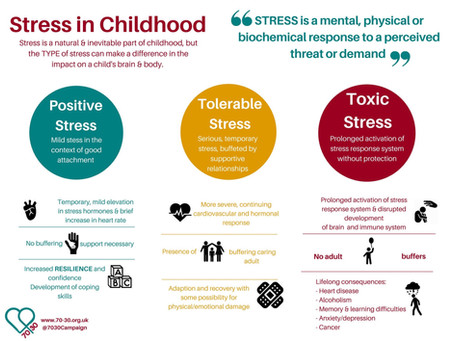Early Adverse Childhood Experiences linked to Chronic Illness in Adults
The greater the number of ACEs (adverse childhood experiences) a person is linked to an increased risk of addictions, cancer, chronic disease, chronic pain, heart disease, mental health issues, and suicide risk throughout the life span.
The ACEs is a study conducted by the Center for Disease Control and the Kaiser Permanente in 1995. It took place in California. They found that ACEs are universal and a larger percentage of those surveyed had at least a score of one. An adverse childhood experiences is:
- parents divorcing or separating
- parent(s) with mental illness]
- parent(s) with addictions
- losing a close person by suicide
- physical abuse
- neglect
- sexual abuse
Neuroscientists believe that being raised in a home where children are exposed to adverse experiences changes the way the brain develops. The constant presence of chemicals such as adrenaline and cortisol from living in toxically stressful environments can have lifelong effects on the adrenal, cardiac, and immune systems.

Know Your Adverse Childhood Experiences Score
My score was a six on the ACEs questionnaire. I grew up in a home with parents who had addiction and mental health issues. There was physical and sexual abuse along with neglect.
I am certain that what I experienced as a child has contributed to the reasons that at 47 I had my first hip replacement. Currently, I am 49 and looking at knee replacements. I have Seronegative Spondyloarthropathy (AS and PsA), P.O.T.S., Hypermobility Spectrum Disorder, PTSD, Anxiety, and High Blood Pressure and Fibromyalgia.
Those of us who have a chronic illness, feel like others think it is something that we are doing to ourselves. Do you eat well enough, do enough yoga, meditate, exercise, or take supplements? I think if we look deeper into what has happened to some of us in this community, we will find that many of us have high ACEs.
If You’re an Adult with a High ACEs Score What Can You Do?
Talk to your physician. Find an agency or counsellor in your community to help you. It won’t cure your chronic illness but it can help you manage the symptoms and live your life to the fullest.
What Can We Do to Lower ACEs for Children and Reduce Their Risk of Chronic Illness?
We can start by supporting parents. Offering parenting classes so parents can understand how their choices can affect their child’s long-term health. We need to support families with affordable housing and daycare options. Parents who can work and provide for their families with the necessities feel better. Parents who feel supported and can provide for their families will be less stressed. Less stressed caregivers can be present for their children.
Hire more mental health workers, such as Child and Youth Workers and Social Workers in schools. These professionals can help to identify those children at risk and work with the entire community to help support that child and family. With the right supports the adrenal systems can change and the brain can repair and make new connections.
Dr. Nadine Burke Harris has a great TED talk about ACEs.